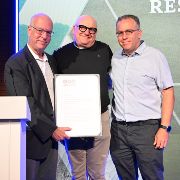BOG 2025: First Dolansky Conference Shines Light on Suicide Prevention
At the 2025 Board of Governors meeting, Tel Aviv University hosted the inaugural Dolansky Conference—a powerful and deeply relevant event marking the first year of the Charles, Evelyne and Sandra Dolansky Research and Treatment Program for Suicide Prevention.
The conference brought together leading voices in mental health, trauma research, and philanthropy. Panelists included Mr. Jeffrey Katz, CPA, President of the Charles, Evelyne and Sandra Dolansky Foundation; Prof. Yair Bar-Haim, Head of the National Center for Traumatic Stress and Resilience; Prof. Amit Lazarov, Director of the Dolansky Program; and Ms. Shani Lavi, the Program’s first research fellow.
Launched in 2024, the Dolansky Program is a multi-tiered initiative with an ambitious and urgent mission:
• To advance cutting-edge research into new treatments for depression and suicidal ideation;
• To deliver critical care through a dedicated clinic on TAU’s campus;
• And to raise awareness and reduce the stigma surrounding mental health across academia and the broader public.
The conference opened with a heartfelt address by Dafna Meitar-Nechmad, Chairwoman of TAU’s Board of Governors. She emphasized the program’s vital role in the current national context, stating: “Since the Oct. 7 attacks, Israeli health authorities estimate that tens of thousands are at high risk of developing severe PTSD. The Dolansky Program is helping us break the silence around depression and spread the message that it's OK to not be OK.” She also announced a major boost for the initiative: the Dolansky Foundation will help complete TAU’s new trauma building, currently under construction on the campus’s southwest edge.
Mr. Katz expressed deep gratitude for the team’s efforts and urged the audience to act with compassion and vigilance: “Don’t let someone you know suffer alone. Take them by the hand and help them find help. Treatment is waiting to make them whole.”
Prof. Bar-Haim highlighted the urgent need for integrated treatment, noting that 58% of patients at TAU’s trauma clinic present with both depression and PTSD—a dangerous combination and a key suicide risk factor.
Prof. Lazarov outlined the program’s robust research output to date, including seven innovative projects and its first supported academic paper, authored by Shani Lavi as part of her PhD thesis. Ms. Lavi closed the session with a short presentation on her research, followed by an engaging Q&A.
As mental health challenges escalate in the wake of national trauma, the Dolansky Program is already making a tangible difference—by bridging science and healing, research and outreach, and awareness and action.






